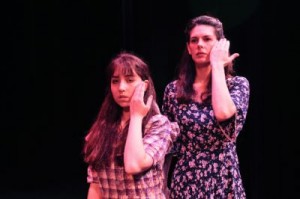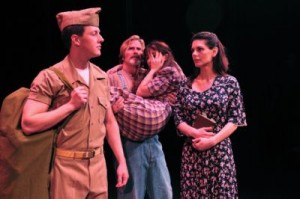
For about a thousand Los Angeles musical theater aficionados, June 15, 2009 will be remembered as the evening Shannon Warne played Violet. As a young woman whose emotional scars run as deep as the facial scar she longs for a miracle to erase, Warne gave one of the most dazzling performances by a lead actress in a musical I have seen in the past several years. That this performance was achieved in a “concert staged reading” allowed a mere twenty-five hours rehearsal time by Actors’ Equity, and that the entire undertaking was every bit as memorable as its leading lady is nothing short of amazing. How lucky to have been at the Alex on June 15!
Violet (the 1997 show’s title as well as the name of its lead character) is one of the unsung treasures of contemporary musical theater. Its glorious score by Jeanine Tesori, whose music for Thoroughly Modern Millie, Caroline, Or Change, and Shrek The Musical has since earned her three Tony Award nominations, may well be Tesori’s best. With lyrics by Brian Crawley and a powerful book by Crawley based on the story “The Ugliest Pilgrim” by Doris Betts, Violet takes the audience, and its title character, on a journey from Spruce Pine, North Carolina to Fort Smith, Arkansas, with stops in Kingsport, Nashville, Memphis, and Tulsa. It is a journey in search of hope, forgiveness, and redemption, and powerful stuff for a musical, but sprinkled with enough comic interludes to make it every bit as entertaining as it is moving.
The life of thirteen-year-old Violet Karl (Maggie Hecht-Herskowitz) was inexorably changed on the day her father’s axe blade flew accidentally off its handle and left a deep, ragged scar stretched across her cheek and the bridge of her nose. For five years, Violet’s father (Gordon Goodman) saved every penny he could to pay for an operation to restore Violet’s unscarred face, only to learn that he had waited too long. Now, in 1964, two years after her father’s death, twenty-five year-old Violet (Warne) has pinned all her hopes and dreams on a televangelist (Chris Warren Gilbert), who she is convinced can bring about a miracle and give her “a pair of Gene Tierney eyes, Judy Garland’s pretty chin, Grace Kelly’s little nose, Rita Hayworth’s skin, Ava Gardner’s eyebrows, Ingrid Bergman’s cheekbones …” A tough order for a miracle, but one Violet truly believes she can have granted if only she believes hard enough.
On her journey by Greyhound Bus, Violet meets two soldiers, smooth-talking Caucasian Monty (Brandon Michael Perkins) and more reserved African American Flick (Josh Tower). Though Violet is at first unsure about what to say and how to behave around a “Negro,” she soon finds herself completely at ease with the two men and proves herself a whiz at poker, earning herself the men’s respect. Despite, or perhaps because of her facial scar, Violet has become a spunky young woman, one who knows what she wants, and what she wants, at least right now, is Monty. Whether she will end up with him, or with Flick (who earns audience sympathy as the more upstanding of the two), is left unanswered until the final moments of the musical, and the exquisite, deeply moving “Bring Me To Light.” (“If I tell you my heart has been opened wide, if I tell you I’m frightened, if I show you the darkness I hold inside, will you bring me to light?”)
Under Richard Israel’s inspired direction, the eleven-member cast assembled by Musical Theatre Guild was one of the most all around vocally gifted ensembles ever to perform in an MTG reading. When their voices joined in the glorious harmonies of what I assume were Tesori’s original vocal arrangements, the result was truly heavenly (a word I don’t recall having used in a review).
The folks at MTG could not have picked a better cast for Violet. Perkins was a perfect Monty, in Violet’s words “a boy in the skin of a man, (who) thinks he’s a born gift to women, thinks he’s irresistible.” That’s not to imply that Perkins is Monty in real life, but his combination of boy next door looks and charm allowed him to fit nicely in Monty’s skin, and his fine acting chops filled in the rest. As Monty’s rival for Violet’s affections, Tower made an MTG debut as memorable as his recent turn as Judas in Jesus Christ Superstar, but refreshingly more sympathetic. And what magnificent voices these two performers have been gifted with!
Goodman was heartbreakingly real as Violet’s guilt-ridden father, and eighteen-year old Hecht-Herskowitz captured all of teenage Violet’s vulnerability and spunk. Needless to say, father-daughter’s vocal performances could not have been improved upon.
Supporting roles and cameos were divided up among Dane Biren, Jill Marie Burke, Dan Callaway, Karole Foreman, Gilbert, and Tracy Lore, this superb mix of MTG Artists and Guest Artists representing the best L.A. musical theater has to offer, both vocally and as actors. Biren did terrific work as all the younger male characters, including Billy Dean, the boy teen Violet loses her virginity to even though she knows it’s to win a dare, and a character known only as “Creepy Guy.” In the role of “Music Hall Singer,” a sensational Burke belted “Lonely Stranger” up to the rafters. Callaway was as always a standout in a grand total of seven roles. Foreman proved a fine and feisty landlady and one amazing gospel choir soloist. In a whirlwind of a performance, Gilbert stole every scene he was in as the charismatic preacher Violet hopes will give her a miracle. Lore got laughs ga-Lore playing against type and well above age as the old lady Violet meets on the Greyhound, then followed that with a 180 degree turn as a sexy hotel singer whose killer pipes joined with Burke’s in “Anyone Would Do.”
Ultimately though, the evening of June 15 belonged to Warne’s Violet, a character who never once leaves the stage, and a performance made even more remarkable by the fact that the entire production was put together in a couple dozen hours of rehearsal. There hasn’t been a female MTG performance of this magnitude and depth this since Tami Tappan Damiano’s Queenie in 2005’s The Wild Party—and that’s saying a lot considering how many great performances have been given in the ensuing four years.
Without prosthetic makeup, Warne allowed the audience to “see” Violet’s face-deforming scar (and the even deeper ones inside). As a singer, it’s hard to conceive of anyone else doing Tesori’s melodies better justice than Warne, whose exquisite soprano soared in “Lay Down Your Head,” “Look At Me,” and “Promise Me Violet,” the latter sung in tandem with the equally vocally gifted Perkins and Tower. As an actress, Warne gave a performance of depth and subtlety, and just how thoroughly she had “become” Violet was particularly evident as “the ugliest pilgrim” stood apart from the Tulsa gospel choir as they sang “Raise Me Up,” simply taking it in, precisely as Violet would have, her journey nearly over, only the miracle left to perform—and all of this sketched in her face and her body language.
A pair of dramatic scenes gave further proof that Warne is not just a musical theater leading lady with a voice to make angels weep, she is an actress of first magnitude who could just as easily command the stage in a straight play as a musical. The first scene was a confrontation between Violet and the televangelist, one in which Violet stands tall and brave and defiant, even face to face with a man who towers over her physically. The second was even more powerful, the scene in which Violet finally gets answers—and an apology—from the father whose axe stroke let loose the blade which scarred her face and soul. Both actors completely off-book, Warne and an equally fine Goodman dug deep to expose the layers of pain that father and daughter had carried with them for so many years. That this scene occurred only in Violet’s imagination, her father having died two years previously, made it even more poignant.
The concert staged reading format worked better with Violet than with just about any other MTG musical in recent memory. Since at its heart Violet is a personal story, it suffered almost not at all from a lack of sets. Straight back black chairs were all that was needed to suggest a bus, and rather than place them in a typical bus configuration, director Israel scattered pairs of chairs across the stage, two passengers per pair, thereby allowing the audience to see what each passenger was doing (knitting, reading, looking out the window) and filling the large Alex Theatre stage better than a more literal configuration would have. Add a small table to a pair of chairs and the setting became a roadside diner. Push a few wooden boxes together to make a bed and the scene had changed to a hotel room.
A seven-piece onstage orchestra led by Alby Potts on keyboard (assistant musical director Matthew Smedel also on keyboard) managed to sound like many more. Though Violet is not a traditional dance show, choreographer Shauna Markey added some bouncy 1960s dance sequences at just the right moments. MTG resident stage manager Art Brickman managed backstage duties with accustomed aplomb.
Reviews on this site are customarily written in present tense, but Violet’s has been written almost entirely in past tense, this incredible experience having been a one-time-only event, with only memories which remain. Not since 2006’s A Man Of No Importance has an MTG concert staged reading cried out so loudly for a full production, and this is one show that could work equal wonders in an intimate venue. If anyone with the power to do so is reading this, please please stage this show, and worry not about finding a dream director to helm the project or dream cast to perform it. The team that put together this incredible evening of theater could not possibly be improved upon.
Musical Theatre Guild, The Alex Theatre, 216 N. Brand Ave., Glendale. www.musicaltheatreguild.com
–Steven Stanley
June 15, 2009




 Since 2007, Steven Stanley's StageSceneLA.com has spotlighted the best in Southern California theater via reviews, interviews, and its annual StageSceneLA Scenies.
Since 2007, Steven Stanley's StageSceneLA.com has spotlighted the best in Southern California theater via reviews, interviews, and its annual StageSceneLA Scenies.







 COPYRIGHT 2024 STEVEN STANLEY :: DESIGN BY
COPYRIGHT 2024 STEVEN STANLEY :: DESIGN BY